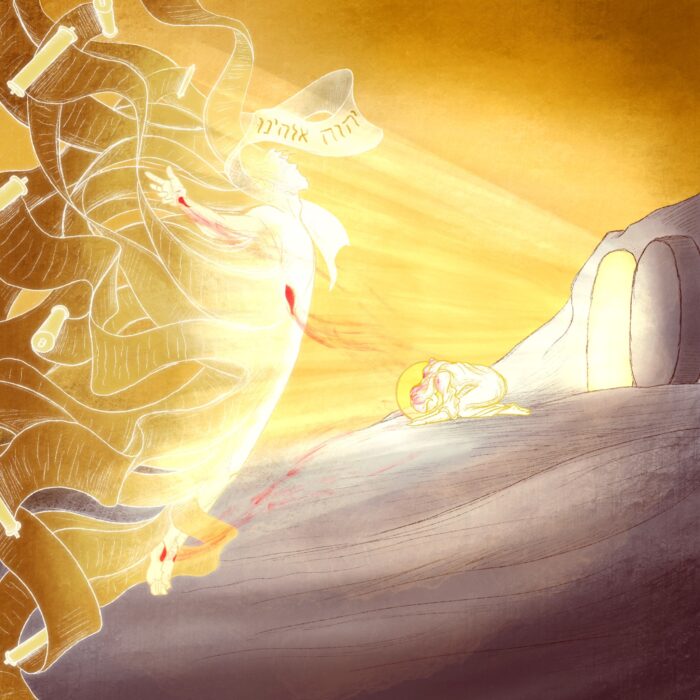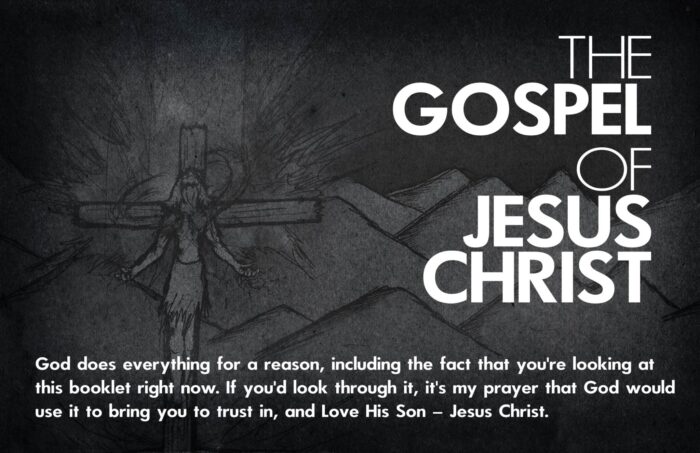
Romans 10:4,9, “Christ is the end of the Law for righteousness to everyone who believes….becuase if you confess with your mouth that Jesus is Lord and believe in your heart that God raised Him from the dead, you will be saved.”
There are no “short thoughts” today, the text from Romans says pretty clearly all I’d want to say….however, if you’d like to hear the “long thoughts” for today’s post, you can check them out below
__________
For thoughts about Christ as the “end” or “fulfillment” of the Law (and the Prophets), I‘d point you to a sermon I preached two weekends ago (plus, there you will see an older version of this picture).
For thoughts about what it means to receive Christ as the end of the Law by faith….here are some things I put together last night:
Christ as the “End of the Law” means that He is both the one who brings the Law to an end (as it had functioned before Him), and that He is the appointed goal / fulfillment / accomplished of the Law. Christ is the “end” of the Law the way that a finish line is the end of a race (Moo), or that a portrait is the end of painting. It is both its completion and its goal.
Now……the end (goal and completion) of the law is “Christ for righteousness” to all who believe…….who believe what?
Well, the object of belief seems to be that which is proclaimed by the “word of faith” which Paul preaches (v.8), namely 1) That Jesus is “Lord.” And 2) that He died and was raised again by God from the dead.
Saving Faith In Romans 10, Point 1 — Jesus is YHWH
Now, the “Lord” of point 1 seems not simply to mean “Master,” but to be the Old Covenant Name of God, “YHWH” — The Name that communicated His character. Now, why do I say this?
Notice that there are three instances both of “mouth” and “heart” in Romans 9-13. The first set is inRomans 10:9, to confess (mouth) Jesus as Lord and to believe (heart) that God raised Him from the dead. The second is in Romans 10:10, where we read that with the heart one believes (heart) and with the mouth one confesses (mouth). Then, Paul supports this statement by giving us the third and final set. In Romans 10:11 he supports his statement that with the heart one believes and is justified by citing Isaiah 28:16, “everyone who believes (heart) in Him will not be put to shame.” And then, in Romans 10:13, he gives the final support by citing Joel 2:32, saying, “everyone who calls (mouth) on the Lord (YHWH in the MT) will be saved.”
So, what we see when we trace all of the “mouth” texts is that the confession of Jesus as “Lord” corresponds to calling on “YHWH.” It seems most likely, then, that the “Lord” whom Christians must confess Jesus to be is the “Lord” of Joel 2:32, the Lord upon whose name to call is to be saved. And this “Lord” is YHWH. And so the confession of Jesus as Lord—which is crucial to receiving Him as the end of the law for righteousness(and, indeed, which is perhaps the most foundational Christian confession)—the confession of Jesus as Lord means the confession of Jesus as YHWH. Those who would be saved, those who would receive Christ for righteousness as the end of the Law by faith, they must confess that He is and call upon Him as YHWH. To put it simply, the confession that Jesus of Nazareth is the Covenant God of Israel is integral to saving faith.
Saving Faith In Romans 10, Point 2 — God Raised Him From The Dead
But secondly, point 2 states that the Christian must not merely confess Jesus as YHWH, but must also believe that God raised Him from the dead. To be raised from the dead, of course, entails first being dead. Thus, to believe the Christian gospel—to receive Christ as the end of the Law for righteousness by faith—one must confess that YHWH incarnate was slain on a Roman cross and—being dead—was then raised up from the dead by God (the Father). “Foolishness!” cries the mind of man, “The Wisdom and Power of God!” Cry those regenerated by the Spirit.
But consider, these are not two arbitrary confessions, rather, the confession of Jesus as YHWH and the confession that He died and was raised again to life by the Father are integrally connected. In what way?
The Connection Between Points 1 & 2
John makes it clear for us (John 8:28, 12:28, 13:31-32, 17:1-5, 17:26, 19:34-37, 20:27-28)—the Son is revealed to be YHWH precisely in His Father-revealing death of infinite obedience and love on the cross. The confession of Jesus as YHWH and Jesus as slain and risen is like the confession of a man as Moses and that same man as the one who ascended Sinai to receive the Law from God. The identity is manifest by the act…The revelation of Jesus as YHWH comes through the work of sacrificial redemption for which He is slain and subsequently raised to life again.
However, we can see the same correlation in Paul’s writing as well, most clearly in Philippians 2:6-11. There we see that the Son—being God—chose to pour Himself out through the incarnation in the infinite work of obedient love that climaxed with His death on the cross……therefore—Paul says—therefore God has highly exalted Him and bestowed on Him the Name (YHWH) that is above every name, so that, at the name of Jesus every knee should bow in heaven and on earth and under the earth and every tongue confess that Jesus Christ is YHWH to the glory of God the Father. So, in Paul too we see that the death and resurrection of Jesus show Him to be, prove Him to be, reveal Him to be YHWH, the Covenant God of Israel in the flesh.
Indeed, this same interpretation is supported in the next verse, Romans 10:10. Here Paul gives what seems to be the logical progression of the belief that Jesus died and was raised and the confession that He is YHWH (Romans 10:9). And what is that progression?
“For with the heart one believes (that He died and was raised) and is justified, and with the mouth one confesses (Him to be YHWH) and is saved.”
So, in the heart one believes that Jesus died and was raised again. But the confession that they make in response to and as the fitting expression of this belief is not merely “Jesus died and rose again,” but—as verse 9 tells us—it is the confession that He is Lord, that He is YHWH.
This the exact same progression as Philippians 2:6-11 and is the same pattern that John has woven all throughout His gospel. To truly believe in the slain and risen Jesus is to recognize and receive Him as YHWH incarnate, our Lord and our God, the Eternal Son in whom alone and definitively we know the Invisible Father.
_________
– EXCURSUS –
It might be asked—how does His death and resurrection reveal Him to be YHWH? Where to begin?
We could point to the crucifixion as the supreme manifestation of the Name declared in Exodus 34:6-7, the definitive instance of Steadfast Love and Faithfulness (John 1:14), of the merciful and gracious God who is yet infinitely faithful to His covenant (which includes the curse of exile), the God who forgives all sins and yet refuses to clear the guilty, blotting out of His book the one who sins against Him (Exodus 32:33).
We could say how, on the cross, Christ perfectly embodies the YHWH-manifesting Law, loving His God with all that He is and loving His neighbor—even His enemy—as Himself.
We could say how the crucifixion of the Son “incarnates” the Intratrinitarian life of God before the eyes of faith, revealing the infinite self-giving love of the Father to the Son and the Son to the Father by the agency and within the bond of the Holy Spirit (Hebrews 9:14, John 15:9).
We could say that God who is Love manifests His love—and therefore Himself—definitively in the sin-bearing, wrath-absorbing, self-giving death of the Beloved Son on behalf of a rebellious Bride (1 John 4:8-10).
Or finally—though there is an eternity more to say!—we could show how the crucifixion of the Son declares both the Weight and the Wonder of YHWH’s Name. The Weight in that we see damnation poured out on the eternally beloved Son such that He is exiled, as it were, from the presence of God Himself—this the just punishment for our Name-belittling sins. And the Wonder because the one being thus crushed, the one being thus damned is our lord and our God, taking wrath in our place, swallowing death in our place bearing it all in our place, for our sakes.
_________
Conclusion
So, in conclusion, how does one receive the Messiah as righteousness? By faith, by belief, Paul says in Romans 10:4. And then, what must one believe to receive Christ as this Law-completing righteousness? They must confess (believe) that this Jesus is the appearance of, the manifestation of, the coming of, the incarnation of YHWH Himself. And (and we might also say “because”) they must believe that He was both slain and—by the power of God—raised from the dead.
In other words, the faith that saves is the faith that receives the slain and risen Jesus Christ as our Lord and our God, as YHWH, and—therefore (as the OT everywhere bears witness)—as our supreme good, our great joy, our all-satisfying food, our all-thirst-quenching drink, our strength, our song, and our portion forever.
In other words once again, the faith that saves is this: by divine grace “to love YHWH our God (whom we can only know and so love in and as the slain and risen Jesus) with all our heart, mind, soul, and strength.”




